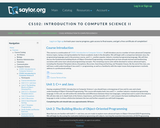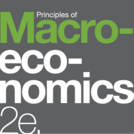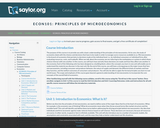
This short document describes the critical difference in business between what a market is versus what an industry is.
- Subject:
- Business and Communication
- Marketing
- Material Type:
- Reading
- Date Added:
- 06/26/2019

This short document describes the critical difference in business between what a market is versus what an industry is.

In this 7 minute video, students will learn the cause(s) and effect of cyclical unemployment. This will aid in the mastery of standard EPF. 5 (b) and (c)

This is a collection of downloadable video clips on the theme of Economic Systems, with guiding questions for students. Clips are drawn from the following PBS WIDE ANGLE documentaries: "To Have and Have Not" (2002), "A State of Mind" (2003), "Ladies First" (2004), "1-800-INDIA" (2005), "Border Jumpers" (2005).

This 9 minute video will expand on oligopolies and how they can coordinate to create collusion and cartel (closer to a monopoly). In doing so, the students will also be introduced to OPEC cartel. This video will aid in mastery in standard EPF. 2 (h) and (i)

This course is a continuation of the first-semester course titled Introduction to Computer Science I. It will introduce the student to a number of more advanced Computer Science topics, laying a strong foundation for future academic study in the discipline. The student will begin with a comparison between Java--the programming language utilized last semester--and C++, another popular, industry-standard programming language. The student will then discuss the fundamental building blocks of Object-Oriented Programming, reviewing what they have learned learned last semester and familiarizing themselves with some more advanced programming concepts. The remaining course units will be devoted to various advanced topics, including the Standard Template Library, Exceptions, Recursion, Searching and Sorting, and Template Classes. By the end of the class, the student will have a solid understanding of Java and C++ programming, as well as a familiarity with the major issues that programmers routinely address in a professional setting. Upon successful completion of this course, the student will be able to: Demonstrate an understanding of the concepts of Java and C++ and how they are used in Object-Oriented Programming; Demonstrate an understanding of the history and development of Object-Oriented Programming; Explain the importance of the C++ Standard Template Library and how basic components are used; Demonstrate a basic understanding of the importance of run-time analysis in programming; Demonstrate an understanding of important sorting and search routines in programming; Demonstrate an understanding of the generic usage of templates in programming for C++ and Java; Compare and contrast the features of Java and C++. (Computer Science 102; See also: Mathematics 303)

This course provides an overview of the following macroeconomic issues: the determination of output, employment, unemployment, interest rates, and inflation. Monetary and fiscal policies are discussed, as are public debt and international economic issues. This course also introduces basic models of macroeconomics and illustrates principles with the experience of the United States and other economies.

Principles of Macroeconomics 2e covers the scope and sequence of most introductory economics courses. The text includes many current examples, which are handled in a politically equitable way. The outcome is a balanced approach to the theory and application of economics concepts. The second edition has been thoroughly revised to increase clarity, update data and current event impacts, and incorporate the feedback from many reviewers and adopters.Changes made in Principles of Macroeconomics 2e are described in the preface and the transition guide to help instructors transition to the second edition.


By the end of this section, you will be able to:Contrast traditional economies, command economies, and market economiesExplain gross domestic product (GDP)Assess the importance and effects of globalization


The purpose of this course is to provide the student with a basic understanding of the principles of microeconomics. At its core, the study of economics deals with the choices and decisions that have to be made in order to manage scarce resources available to us. Microeconomics is the branch of economics that pertains to decisions made at the individual level, i.e. by individual consumers or individual firms, after evaluating resources, costs, and tradeoffs. "The economy" refers to the marketplace or system in which these choices interact with one another. In this course, the student will learn how and why these decisions are made and how they affect one another in the economy. Upon successful completion of this course, students will be able to: Think intuitively about economic problems; Identify how individual economic agents make rational choices given scarce resources and will know how to optimize the use of resources at hand; Understand some simplistic economic models related to Production, Trade, and the Circular Flow of Resources; Analyze and apply the mechanics of Demand and Supply for Individuals, Firms, and the Market; Apply the concept of Marginal Analysis in order to make optimal choices and identify whether the choices are 'efficient' or 'equitable'; Apply the concept of Elasticity as a measure of responsiveness to various variables; Identify the characteristic differences amongst various market structures, namely, Perfectly Competitive Markets, Non-Competitive Markets, and Imperfectly Competitive Markets and understand the differences in their operation; Analyze how the Demand and Supply technique works for the Resource Markets. (Economics 101; See also: Business Administration 200)

This course covers how to leverage major technology advances to significantly transform a business in the marketplace. There is a focus on major issues a business must deal with to transform its technical and market strategies successfully, including the organizational and cultural aspects that often cause such business transformations to fail. Class material draws from concrete experiences of IBM's major transformation in the late 1990s, when it aggressively embraced the Internet and came up with its e-business strategy.

The course explores the interactions between state and market as instigators of China's urbanization, and its consequences of land, housing, transportation, energy, environment, migration, finance, urban inequality. Themes include the de-synchronization of China's urbanization, potential differences between China's past and future development, and differentiators between China's urbanization and those of other countries. This discussion-based course asks students to participate in the conversation with the course instructor and guest lecturers by drawing upon their experiences and academic or professional backgrounds.